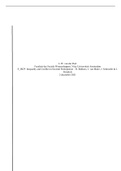L.W. van der Poel
Faculteit der Sociale Wetenschappen, Vrije Universiteit Amsterdam
S_ISCP: Inequality and Conflict in Societal Participation – R. Bekkers, J. van Matre, J. Schroeder & J.
Swinkels
2 december 2021
, 1. Introduction
In sociology, postmaterialism is the transformation of individual values from materialistic,
physical and economic to new individual values of autonomy and self-expression. This term
arose through the theory of political scientist Ronald Inglehart. Inglehart argues that in the
1950s, politics was primarily based on securing economic growth and national security. In the
1960s, politics began to focus on postmodern issues. Inglehart (1997) discusses the political
consequences of the shift to postmaterialism.
This study examines Inglehart's underlying arguments and theories regarding the
factors of postmaterialist values, year of birth and trust in government. Two hypotheses are
formulated on the basis of the theory. The hypotheses are then tested on the basis of a
regression analysis and conclusions are drawn on the basis of the results. The hypotheses will
only be tested on the Serbian population.
Serbia is a country in southeastern Europe and has been an independent state since
2006. Serbia is based in the upper middle income group and has an parliamentary republic
with a president. Serbia has one of the oldest populations in the world with an average age of
42.2 years and the rate of population shrinkage is also very high (The World Factbook, 2021).
The Democracy Index gives an idea of the state of democracy in independent states.
The Democracy Index of Serbia is 6.22 and falls in the “flawed democracy” status (The
Economist, 2020).
The Human Development Index (HDI) measures poverty, education and quality of life
in countries. The higher the value of the HDI index, the higher the country scores on public
health, knowledge and living standards. Serbia's HDI value is set at 0.81, which places it at
position 64 out of 190 countries (HDR, 2020). Serbia's unemployment rate is above the
European average and therefore the country is implementing economic reforms to increase the
country's prosperity.
This article will proceed as follows. The next section provides a theoretical overwie
and after that the most important emperical analyses in the data are summarized. Finally,
theimplications are discussed.
2. Theory
Research on postmaterialist value change has been guided by two key hypotheses. In this
chapter we will explain the hypothesis.






